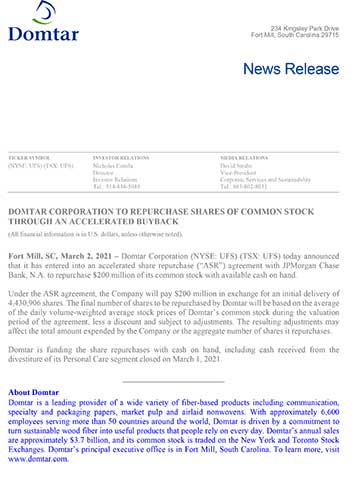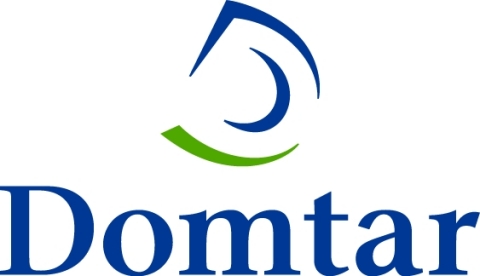FORT MILL, S.C.--(BUSINESS WIRE)--Domtar Corporation (NYSE: UFS) (TSX: UFS) today announced that it has entered into an accelerated share repurchase (“ASR”) agreement with JPMorgan Chase Bank, N.A. to repurchase $200 million of its common stock with available cash on hand.
Under the ASR agreement, the Company will pay $200 million in exchange for an initial delivery of 4,430,906 shares. The final number of shares to be repurchased by Domtar will be based on the average of the daily volume-weighted average stock prices of Domtar’s common stock during the valuation period of the agreement, less a discount and subject to adjustments. The resulting adjustments may affect the total amount expended by the Company or the aggregate number of shares it repurchases.
Domtar is funding the share repurchases with cash on hand, including cash received from the divestiture of its Personal Care segment closed on March 1, 2021.
About Domtar
Domtar is a leading provider of a wide variety of fiber-based products including communication, specialty and packaging papers, market pulp and airlaid nonwovens. With approximately 6,600 employees serving more than 50 countries around the world, Domtar is driven by a commitment to turn sustainable wood fiber into useful products that people rely on every day. Domtar’s annual sales are approximately $3.7 billion, and its common stock is traded on the New York and Toronto Stock Exchanges. Domtar’s principal executive office is in Fort Mill, South Carolina. To learn more, visit www.domtar.com.
Forward-Looking Statements
Certain statements contained in this press release, the information incorporated herein by reference, and other written and oral statements made from time to time by us or on our behalf are based on current projections about operations, industry conditions, financial condition, and liquidity, may not relate strictly to historical or current facts and may contain forward-looking statements that reflect our current views with respect to future events and financial performance. As such, they are considered “forward-looking statements” which provide current expectations or forecasts of future events. Such statements can be identified by the use of terminology such as “anticipate”, “believe”, “expect”, “intend”, “aim”, “target”, “plan”, “continue”, “estimate”, “project”, “may”, “will”, “should” and similar expressions. These forward-looking statements should be considered with the understanding that such statements involve a variety of risks and uncertainties, known and unknown, and may be affected by inaccurate assumptions. Consequently, no forward-looking statement can be guaranteed and actual results may vary materially. Many risks, contingencies and uncertainties could cause actual results to differ materially from our forward-looking statements.




